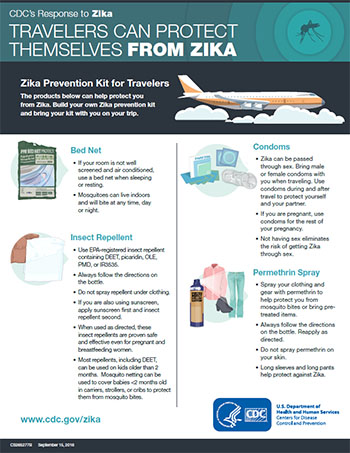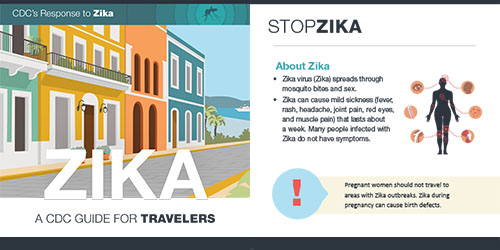Zika Travel Information
Check this page for the most up-to-date information before you make travel plans.
Note: The information on this page is for travelers to international destinations and US territories. For information on Zika in US states, visit Zika in the US. For the most current information about Zika virus, please visit CDC’s Zika website.
Search for a place by name or zoom and click on the map to see CDC's travel recommendations for Zika. Follow the links in the pop-up message to learn more.
| Map Legend | |
| Country or territory with current Zika outbreak1 | |
| Country or territory that has ever reported Zika cases2 (past or current) | |
| Areas with low likelihood of Zika infection because of high elevation (above 6,500 feet/2,000 meters) | |
| Country or territory with mosquito3 but no reported Zika cases2 | |
| Country or territory with no mosquitoes3 that spread Zika | |
| 1 No areas are currently reporting Zika outbreaks | |
| 2 Locally acquired, mosquito-borne Zika cases | |
| 3 Aedes aegypti | |
PDF version of the map (printable)
Zika Travel Recommendations by Traveler Type and Country Category
Know before you go! Zika continues to be a problem in many parts of the world. There is no vaccine to prevent infection. Zika is spread mostly by the bite of an infected Aedes species mosquito (Ae. aegypti and Ae. albopictus). Zika can be passed from a pregnant woman to her fetus. Infection during pregnancy can cause certain birth defects.
Your decision to delay or cancel travel is personal and complex. In making this decision, consider your travel destination and your ability to protect yourself from mosquito bites. CDC recommends that pregnant women and couples planning a pregnancy within the next 3 months consult with a health care provider in making this decision.
Recommendations for US Residents Traveling Abroad
|
Traveler Type |
Country Category |
|||
|
|
|
|
||
| Pregnant women | Do not travel. | Talk to a health care provider about potential risks. If you decide to travel, prevent mosquito bites and sexual exposure to Zika. | Prevent mosquito bites during and after travel. | No Zika precautions recommended. |
| Women planning pregnancy |
Talk to a health care provider about potential risks. If you decide to travel, prevent mosquito bites and sexual exposure to Zika during and after travel. If traveling without male partner, wait 2 months after return before becoming pregnant. |
|||
|
Men with a pregnant partner |
Prevent mosquito bites during and after travel. Use condoms or do not have sex for the rest of the pregnancy. |
|||
|
Men with a partner planning pregnancy |
Prevent mosquito bites during and after travel. Use condoms or do not have sex for at least 3 months after return. |
|||
|
All travelers |
Prevent mosquito bites during and after travel. |
|||
1These countries have a potential risk of Zika, but we do not have accurate information on the current level of risk. As a result, detection and reporting of new outbreaks may be delayed.
2Because Aedes aegypti mosquitoes (the mosquitoes that most commonly spreads Zika) are present in these countries, Zika has the potential to be present, along with other mosquito-borne infections. Detection and reporting of cases and outbreaks may be delayed.
3No Aedes aegypti mosquitoes (the mosquitoes that most commonly spreads Zika) have been reported in these countries. However, other Aedes species mosquitoes have been known to spread Zika, and these may be present.
Areas with Zika outbreaks (red areas):
Areas with current or past transmission but no Zika outbreak (purple areas): American Samoa, Angola, Anguilla, Antigua and Barbuda, Argentina, Aruba, Bahamas, Bangladesh, Barbados, Belize, Bolivia, Bonaire, Brazil, British Virgin Islands, Burkina Faso, Burma, Burundi, Cambodia, Cameroon, Cape Verde, Cayman Islands, Central African Republic, Colombia, Cook Islands, Costa Rica, Cuba, Curacao, Dominica, Dominican Republic, Easter Island, Ecuador, El Salvador, Ethiopia, Federated States of Micronesia, Fiji, France, French Guiana, French Polynesia, Gabon, Grenada, Guadeloupe, Guatemala, Guinea, Guinea-Bissau, Guyana, Haiti, Honduras, India, Indonesia, Ivory Coast, Jamaica, Kenya, Kiribati, Laos, Malaysia, Maldives, Marshall Islands, Martinique, Mexico, Montserrat, New Caledonia, Nicaragua, Nigeria, Palau, Panama, Papua New Guinea, Paraguay, Peru, Philippines, Puerto Rico, Saba, Saint Barthelemy, Saint Kitts and Nevis, Saint Lucia, Saint Martin, Saint Vincent and the Grenadines, Samoa, Senegal, Singapore, Sint Eustatius, Sint Maarten, Solomon Islands, Sri Lanka, Suriname, Thailand, Tonga, Trinidad and Tobago, Turks and Caicos, Uganda, United States (Continental US), United States Virgin Islands, Vanuatu, Venezuela, Vietnam
Areas with mosquitoes but no reported Zika cases (yellow areas): Afghanistan, Australia, Benin, Bhutan, Botswana, Brunei, Chad, China, Christmas Island, Congo, Democratic Republic of Congo, Djibouti, East Timor, Egypt, Equatorial Guinea, Eritrea, Georgia, Ghana, Guam, Liberia, Madagascar, Madeira Islands, Malawi, Mali, Mauritania, Mozambique, Namibia, Nauru, Nepal, Niger, Niue, Northern Mariana Islands, Oman, Pakistan, Russia, Rwanda, Saudi Arabia, Sierra Leone, Somalia, South Africa, South Sudan, Sudan, Taiwan, Tanzania, The Gambia, Togo, Tokelau, Turkey, Tuvalu, Uruguay, Wallis and Futuna, Yemen, Zambia, Zimbabwe
Areas with no mosquitoes that spread Zika (green areas): Albania, Algeria, Andorra, Armenia, Austria, Azerbaijan, Azores, Bahrain, Belarus, Belgium, Bermuda, Bosnia and Herzegovina, British Indian Ocean Territory, Bulgaria, Canada, Canary Islands, Chile, Cocos Islands, Comoros, Corsica, Croatia, Crozet Islands, Cyprus, Czech Republic, Denmark, Estonia, Eswatini, Falkland Islands, Faroe Islands, Finland, Germany, Gibraltar, Greece, Greenland, Guernsey, Hong Kong, Hungary, Iceland, Iran, Iraq, Ireland, Isle of Man, Israel, Italy, Japan, Jersey, Jordan, Kazakhstan, Kerguelen Islands, Kosovo, Kuwait, Kyrgyzstan, Latvia, Lebanon, Lesotho, Libya, Liechtenstein, Lithuania, Luxembourg, Macau, Malta, Mauritius, Mayotte, Moldova, Monaco, Mongolia, Montenegro, Morocco, Netherlands, New Zealand, Norfolk Island, North Korea, North Macedonia, Norway, Pitcairn Islands, Poland, Portugal, Qatar, Reunion, Romania, Saint Helena, Saint Paul and New Amsterdam Islands, Saint Pierre and Miquelon, San Marino, São Tomé and Principe, Serbia, Seychelles, Slovakia, Slovenia, South Georgia and the South Sandwich Islands, South Korea, Spain, Sweden, Switzerland, Syria, Tajikistan, Tunisia, Turkmenistan, Ukraine, United Arab Emirates, United Kingdom, Uzbekistan, Vatican City, Wake Island, Western Sahara
Technical note: Because of variations in laboratory and surveillance capacity internationally, data are not available to define levels of risk. CDC, the World Health Organization, and the European CDC have jointly reviewed the scientific literature.
- Zika: For Healthcare Providers on CDC's Zika site
- Zika in CDC Yellow Book
- Clinical Guidance for Healthcare Providers Caring for Pregnant Women
- Update: Interim Guidance for Preconception Counseling and Prevention of Sexual Transmission of Zika Virus for Men with Possible Zika Virus Exposure — United States, August 2018



CDC Travelers' Health on Facebook
CDC Travelers' Health on Twitter
Get Email Updates